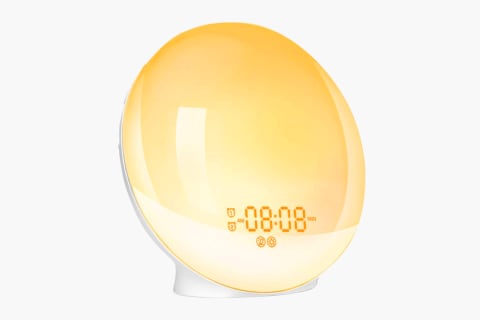Advertisement
The Scientific Reason Mornings Feel So Stressful (And What You Can Do About It)

BEEEP!
Your alarm goes off. You hit the snooze (a few times).
Groggy and tired, you roll over and grab your phone to check your email, Instagram, and a long string of headlines. Since you're already running late, you rush out the door and barrel into your day.
Sound familiar?
It turns out, your body is primed to feel stressed in the a.m. That's because cortisol levels rise during the early morning hours and are highest at about 7 a.m. Levels drop in the evening and during the early phase of sleep, according to the University of Michigan School of Medicine. And even though cortisol gets a bad rap for being a stress hormone, it is essential for life. Humans need it to keep their brains functioning and blood circulating. "If we didn't have high cortisol in the mornings, we wouldn't have the energy to get out of bed," says Kristina Hallett, Ph.D., a board-certified psychologist. "In the best-case scenario, we wake up refreshed and energized to greet the day."
We always have cortisol circulating in the body, but when we encounter a stressor (like traffic), cortisol and adrenaline spike to give us more energy to deal with the problem. But excess cortisol when we're stressed or anxious can affect our health if our levels stay too high for too long.
Hallett reveals eight simple, science-backed stress-reduction techniques to try during peak cortisol times. They might just turn you into a morning person.
Get up 10 minutes earlier.
OK, bear with us: By getting up a tiny bit earlier, you give yourself more time and your mornings will feel less hectic. Hallett suggests taking it slow in the morning, waking up gently, and avoiding electronics if glancing at your inbox or the news gives you anxiety.
Don't hit the snooze.
"The snooze is not your friend," Hallett says. "If you hit it, your body still has this sense of 'How much time do I have left?' And even if you fall asleep, it's such a short time. You're only getting a teeny bit of a sleep cycle, so you end up more tired."
She says you're better off setting an alarm for the time you actually want to get out of bed. And while you're at it, switch your alarm to a sound that's calming—such as wind chime—and not jarring.
Start a morning ritual.
Whether it's doing stretches in bed, a guided meditation, journaling, or deep breathing, spending five to 10 minutes each a.m. doing any self-care activity will put you in an upbeat mood, says Hallett. Avoid social media or the news first thing if it puts you into a comparison or negative mindset.

Consider a supplement.
Integrative Therapeutics® Cortisol Manager® is formulated with stress-reducing ingredients and botanicals to promote relaxation, fight fatigue, and support healthy cortisol levels.* By balancing cortisol levels with extensively studied ingredients including ashwagandha and L-theanine, Cortisol Manager might help you reduce and cope better with stress.* The bonus of adding it to your routine is supporting your body's natural cortisol circadian rhythm; Cortisol Manager can reduce stress, which supports restful sleep without diminishing morning and daytime alertness.*
Try an affirmation.
Hallett, who is gearing up to give a TED Talk about the science of self-affirmations, suggests people pick one that is both specific and reasonable. So instead of "I can do anything," it's more like, "I have the ability to have a good day" or "I have the ability to manage my day." Over-the-top statements tend to backfire: "The minute you say something you don't believe, you can feel worse," she says.
Add aromatherapy.
Hallett uses a citrus-scented shower gel in the mornings to help her feel energized. She suggests finding a scent that you like and that you associate with positivity and energy. Make your shower more mindful by taking the time to really notice the smell. "I connect it," she says. "I start my day. I feel good. I'm going to have a good day."
Limit caffeine.
Before you reach for a cup of coffee or tea, down a mug of hot water with lemon first. "It will wake you up without the jitters," says Hallett. Try to keep your coffee consumption to one per day to keep your nerves soothed.
Eat protein for breakfast.
Fuel your body with protein to give you sustained energy—and to help you avoid temptations like sugary muffins or doughnuts that could lead to a crash, says Hallett. But if you don't feel hungry when you wake up, don't worry. Just grab a bite once you feel peckish.
Prep the night before.
Hallett spends five to 10 minutes each evening gathering her workout clothes and packing lunch for the next day. "This allows you to not feel so rushed in the morning," she says.
*These statements have not been evaluated by the Food & Drug Administration. This product is not intended to diagnose, treat, cure, or prevent any disease.



